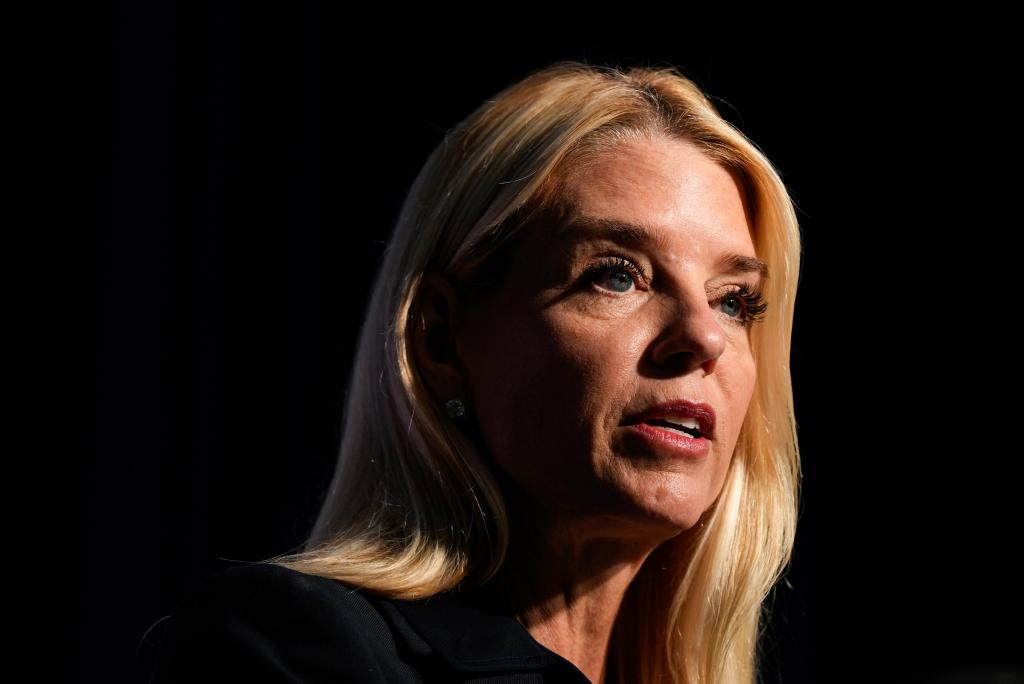There is a perverse symmetry in two recent events reflecting the limp ethics of Pam Bondi, President Trump’s attack-dog attorney general.
She testified — to put it loosely — before the Senate Judiciary Committee on Oct. 7. But rather than answer well-founded questions about her record at the Department of Justice, she was primed to insult Democratic senators.
A news photographer captured a manila folder filled with prepared lines of attack aimed at specific senators, including Sen. Sheldon Whitehouse, D-R.I. She called him a hypocrite while deflecting his questions of what happened to $50,000 that disappeared in a mysteriously abandoned bribery probe of Trump’s border czar, Tom Homan.
Bondi thoroughly disgraced herself, the DOJ and the profession of law. Sad to say, it wasn’t the first time — and won’t be the last.
In the second event, six days later, the Florida Supreme Court arbitrarily dismissed a well-founded petition seeking to compel the Florida Bar to investigate pre-existing ethics complaints against Bondi.
The court takes a dive
In a six-line order, five justices said Jon May, the Boca Raton attorney seeking to hold Bondi responsible for unprofessional conduct, had “failed to show a clear legal right to the relief requested.”
The court took a dive rather than decide whether the Bar, where Bondi holds her only license to practice law, is bound by its own rules to enforce them against even the most powerful.
Out of hand, the Bar rejected valid complaints against Bondi’s conduct after Trump appointed her. It explained only that to conduct disciplinary proceedings against federal constitutional officials while they are in office “could encroach on the authority of the federal government concerning these officials and the exercise of their duties.”
No such exception appears in the Bar’s extensive published regulations, which purport to govern all Florida lawyers regardless of where they work or for whom.
The complaints were filed by May and by Lawyers Defending Democracy and two other professional groups. Among the 70 individual signers were retired Florida Supreme Court Justices Barbara Pariente and Peggy Quince and Martha Barnett, a Tallahassee lawyer and a past president of the American Bar Association.
Challenging Bondi’s firings
May’s petition, submitted to the court Aug. 12, pointed out that Bar rules entitle “any person” to file an ethics complaint. Those who do, he contended, “are not seeking to vindicate a private right, they are initiating a process to protect the public.”
The original complaint cited Bondi for having fired or forced out DOJ lawyers who refused to execute orders they considered unethical. Those earlier events pale beside her recently carrying out Trump’s command to indict former FBI director James Comey and New York Attorney General Letitia James over flimsy charges that career DOJ prosecutors refused to file.
Bondi didn’t respond on her own behalf to May’s petition. But the DOJ did, arguing among other things that “state courts may not supervise, regulate, or impede the Attorney General’s execution of federal law through state licensing or ethics rules.”
Florida Attorney General James Uthmeier took that to its extreme, arguing that Bondi would be entitled to “permanent, absolute immunity from state bar discipline” — even after leaving office.
Uthmeier goes to extremes
He contended that “Florida has an obvious interest in preventing the Florida Bar from deteriorating into an implement of partisan lawfare,” which he defined as using “legal systems and institutions to damage, delegitimize, or hinder an opponent for political aims.”
That is precisely what Bondi has been doing for Trump by weaponizing the DOJ against his perceived enemies Comey, James and surely others to come.
Uthmeier must have been unconscious to the irony.
The Watergate scandal was supposed to have taught our nation an abiding lesson against prostituting the Justice Department to politics. Since then, every president except Trump has kept a respectful and proper distance.
Only three women have been attorneys general of the United States, and two were Floridians. But the contrasts between Bondi and the late Janet Reno, President Bill Clinton’s attorney general, could not be greater.
The fiercely independent Reno did not involve the White House in her high-tension decision to return six-year-old Elian Gonzalez to his father in Cuba over the frenzied objections of Miami relatives who had cared for him since his mother drowned at sea trying to escape Cuba with him.
With Reno, parental rights trumped geopolitics.
She also honored the request of Ken Starr, the special counsel investigating the Clintons’ real estate transactions, to broaden his probe into suspected perjury concerning the president’s affair with a White House intern. That led to his impeachment by the House (the Senate did not convict him), but Reno kept her hands off the case and Clinton kept her until he left office.
Bondi disgraces the office that Reno exalted.
By giving her a pass, the Florida Supreme Court took the easy but faint-hearted way out of having to decide the serious issue of her alleged immunity.
Immunity easily morphs into impunity. What will Bondi get away with next?
The Sun Sentinel Editorial Board consists of Opinion Editor Steve Bousquet, Deputy Opinion Editor Dan Sweeney, editorial writers Pat Beall and Martin Dyckman, and Executive Editor Gretchen Day-Bryant. To contact us, email at letters@sun-sentinel.com.
Originally Published: October 18, 2025 at 8:00 AM EDT

